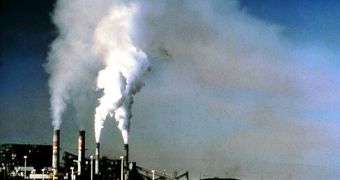Researchers were disappointed to find that the drop in carbon dioxide (CO2) concentrations predicted for last year was a lot lower than anyone expected. The same trend is most likely in store for 2010 as well, experts say, which means that we could see record CO2 levels being set yet again.
From the record levels achieved in 2008, climate scientists predicted that CO2 emissions would decrease by 2.5 to 3 percent in 2009. Yet, the decrease was only half that, or 1.3 percent, even with the financial crisis hitting all western economies head on.
Countries such as the United States, the United Kingdom, Germany, France and Japan experienced emission reductions of around 8 percent in 2009, as compared to the previous year. But other countries emitted more carbon.
Emerging economies boomed even while the rest of the world was facing a harsh recession. China boosted its pollution levels by 8 percent, whereas India emitted 6.2 percent more carbon in 2009 than 2008.
These are the conclusions of a new study conducted by researchers at the University of Exeter and the University of East Anglia, both in the UK, in collaboration with other research centers. The study will be included in the annual carbon budget update produced by the Global Carbon Project.
The initiative appeared so that the international science community can establish a common, mutually agreed knowledge framework for policy debate and action in combating global warming and climate change.
The new research paper appears in the November 22 issue of the esteemed scientific journal Nature Geoscience. Its main conclusion is that the slow decrease rate is due to pollution emitted by emerging economies. Most of these nations rely on coal for energy, and this fossil fuel is highly polluting.
“The 2009 drop in CO2 emissions is less than half that anticipated a year ago,” explains the lead author of the Nature paper, professor Pierre Friedlingstein.
“This is because the drop in world Gross Domestic Product (GDP) was less than anticipated and the carbon intensity of world GDP, which is the amount of CO2 released per unit of GDP, improved by only 0.7 per cent in 2009 – well below its long-term average of 1.7% per year,” he adds.
In the investigation, scientists say that, as the world recovers from the economic crisis, emissions will most likely increase by up to 3 percent this year. The exact figures will be available in early 2011.
The report also has some good news. Experts write that deforestation produced some 25 percent less CO2 since 2000, when compared to 1990 levels. This is the result of reducing CO2 emissions from tropical deforestation.
“For the first time, forest expansion in temperate latitudes has overcompensated deforestation emissions and caused a small net sink of CO2 outside the tropics,” explains UEA professor Corinne Le Quéré.
“We could be seeing the first signs of net CO2 sequestration in the forest sector outside the tropics,” adds the investigator, who is also an author of the Nature study, and an expert with the British Antarctic Survey, Science Blog reports.

 14 DAY TRIAL //
14 DAY TRIAL //